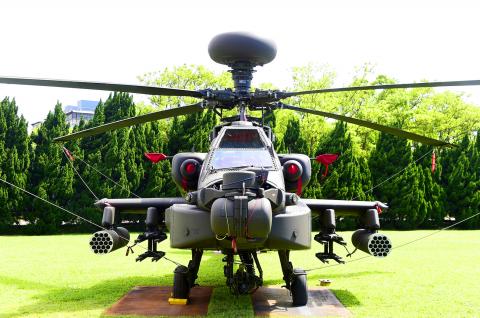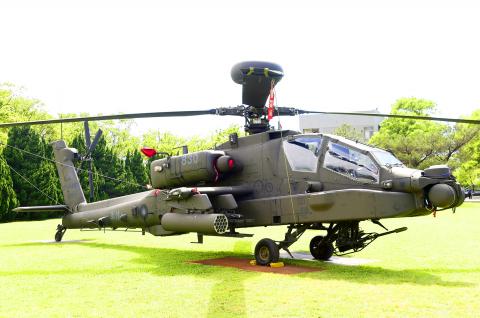The Republic of China Army 601st Air Cavalry Brigade is to formally become the first air brigade to be fully equipped with Boeing Co AH-64E Apache attack helicopters following a ceremony on Wednesday next week, a Ministry of National Defense official said yesterday.
President Tsai Ing-wen (蔡英文) is to officiate at the ceremony, which is being planned by the Army Command Headquarters, the official said on condition of anonymity.
Other distinguished guests would also attend the ceremony, where the helicopters’ capabilities would be demonstrated, he added.

Photo: Pan Shao-tang, Taipei Times
Some officials have said that in addition to Boeing representatives, several officers from the US Army’s 25th Combat Aviation Brigade, the air brigade’s sister unit, would also attend the ceremony.
When asked for comment, the ministry and headquarters declined to confirm or deny the claim, citing the sensitive nature of Taiwan-US relations.
The 601st and 602nd Air Cavalry brigades operate under the Army Aviation and Special Forces Command, with the former fielding all 29 of Taiwan’s serviceable Apaches and the latter fielding older AH-1W Cobra attack helicopters.

Photo: Pan Shao-tang, Taipei Times
Responsible for the defense of northern Taiwan, the 601st has two combat aviation squadrons that provide air support as part of the army’s air-land combined arms strategy, alongside armor, artillery, special forces and infantry units.
The first squadron, which has recently passed operational readiness evaluations, is tasked with training new Apache pilots in addition to its regular duties, the official said.
As the second squadron was declared operational in July last year, the entire brigade is now combat-ready, he said.
The Apache attack helicopter is a mobile and powerful weapons platform armed with a 30mm chain gun and, depending on the mission, a mixture of Hellfire anti-tank missiles, 2.75-inch Hydra rockets and Stinger air-to-air missiles, he said.
The Apache E variant’s most significant equipment is the Longbow fire-control radar located on top of the rotor mast, which provides day-and-night, all-weather, 360-degree search capabilities for air and ground targets, the official said.
The helicopter can simultaneously track 128 targets and engage 16 of them, making it more lethal and more likely to survive, he added.
Each Apache E can designate targets and extend air combat control to up to three other gunships, which means that the army does not need to equip all the helicopters with Longbow radar, he said.

AIR SUPPORT: The Ministry of National Defense thanked the US for the delivery, adding that it was an indicator of the White House’s commitment to the Taiwan Relations Act Deputy Minister of National Defense Po Horng-huei (柏鴻輝) and Representative to the US Alexander Yui on Friday attended a delivery ceremony for the first of Taiwan’s long-awaited 66 F-16C/D Block 70 jets at a Lockheed Martin Corp factory in Greenville, South Carolina. “We are so proud to be the global home of the F-16 and to support Taiwan’s air defense capabilities,” US Representative William Timmons wrote on X, alongside a photograph of Taiwanese and US officials at the event. The F-16C/D Block 70 jets Taiwan ordered have the same capabilities as aircraft that had been upgraded to F-16Vs. The batch of Lockheed Martin

GRIDLOCK: The National Fire Agency’s Special Search and Rescue team is on standby to travel to the countries to help out with the rescue effort A powerful earthquake rocked Myanmar and neighboring Thailand yesterday, killing at least three people in Bangkok and burying dozens when a high-rise building under construction collapsed. Footage shared on social media from Myanmar’s second-largest city showed widespread destruction, raising fears that many were trapped under the rubble or killed. The magnitude 7.7 earthquake, with an epicenter near Mandalay in Myanmar, struck at midday and was followed by a strong magnitude 6.4 aftershock. The extent of death, injury and destruction — especially in Myanmar, which is embroiled in a civil war and where information is tightly controlled at the best of times —

China's military today said it began joint army, navy and rocket force exercises around Taiwan to "serve as a stern warning and powerful deterrent against Taiwanese independence," calling President William Lai (賴清德) a "parasite." The exercises come after Lai called Beijing a "foreign hostile force" last month. More than 10 Chinese military ships approached close to Taiwan's 24 nautical mile (44.4km) contiguous zone this morning and Taiwan sent its own warships to respond, two senior Taiwanese officials said. Taiwan has not yet detected any live fire by the Chinese military so far, one of the officials said. The drills took place after US Secretary

THUGGISH BEHAVIOR: Encouraging people to report independence supporters is another intimidation tactic that threatens cross-strait peace, the state department said China setting up an online system for reporting “Taiwanese independence” advocates is an “irresponsible and reprehensible” act, a US government spokesperson said on Friday. “China’s call for private individuals to report on alleged ‘persecution or suppression’ by supposed ‘Taiwan independence henchmen and accomplices’ is irresponsible and reprehensible,” an unnamed US Department of State spokesperson told the Central News Agency in an e-mail. The move is part of Beijing’s “intimidation campaign” against Taiwan and its supporters, and is “threatening free speech around the world, destabilizing the Indo-Pacific region, and deliberately eroding the cross-strait status quo,” the spokesperson said. The Chinese Communist Party’s “threats